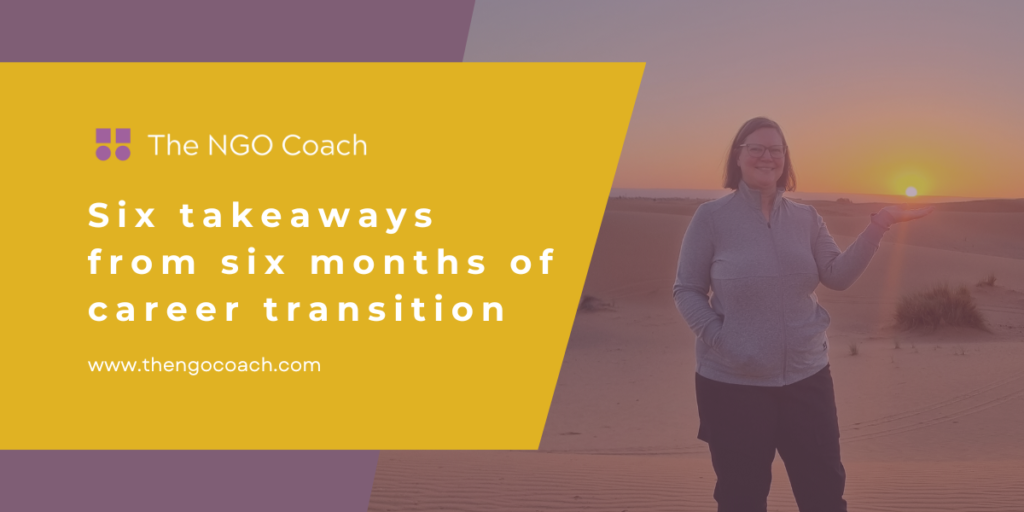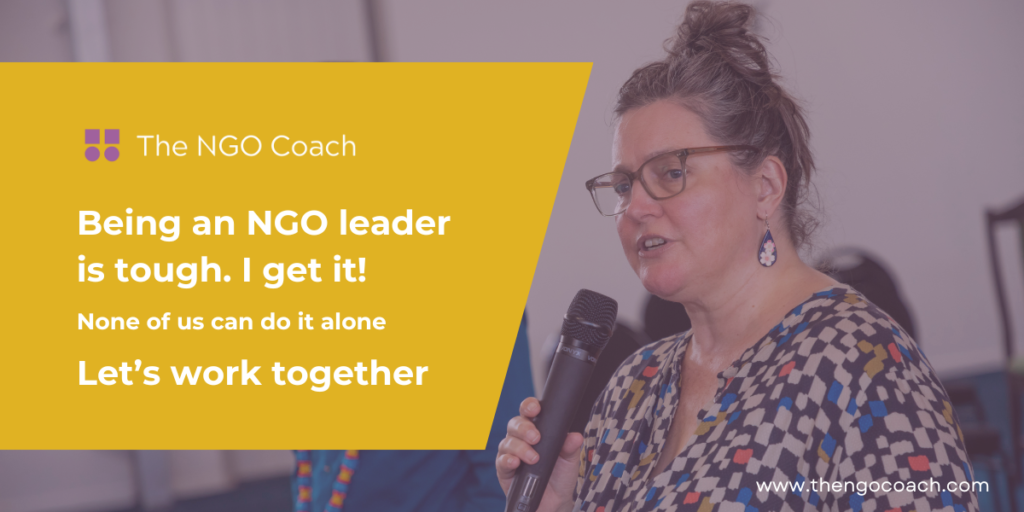Are you thinking about making a career transition? Perhaps you’re already in the midst of one, either by choice or because circumstances have nudged you in that direction. I’d certainly recommend you set aside some serious time and space to contemplate what’s next. Taking a break between jobs is an excellent opportunity to reflect on what’s working, what’s not, and what needs to change. Many of us will undergo significant career changes multiple times in our lifetimes. How do you want your career transition phase to look and feel?
I spent much of 2023 pondering where my career would go next. After nearly 15 years leading NGOs (among other roles), I knew I wanted to actively choose a different way to live. At that point, I had already dedicated a good part of the previous two to three years to regaining my health and learning to better balance the weight of responsibility I felt for the communities I served with my personal well-being.
The last six months of my career transition have been surprising and more challenging than I could have foreseen. Here are six takeaways from this period:
1. My Job Title Does Not Define My Identity
My career as a Chief Executive of an NGO became deeply embedded in my self-image. I became seen by others and myself as a community leader. I had a team to manage, responsibilities to my board, relationships with funders, and a high level of decision-making and influence. This opened doors for me and provided a level of credibility and recognition. Suddenly, that all disappeared, and I was just Rochelle again.
I’ve had other career transitions over the years, but this one has been more unsettling given my passion for the NGO sector. This experience has made me better understand those who hold onto their previous titles, like Past President or Former Chair. I often find myself mentioning my previous roles when out in public which is a habit I’m trying to kick!
2. My Support System Has Changed
So much of my support system has been tied to my role. I have written about the different groups I was a part of, including my peer Chief Executives. Because I saw and chatted with them so often, we merged our work and personal conversations together.
Now, those formal and informal meetings aren’t in my diary. I’m not chatting with my staff about our mahi. I’m not traveling around the country, connecting with other community groups and leaders. I’m also far less interested in the latest government changes, funder activities, or new research—all things I would have been buzzing about as an NGO leader. Transitioning work relationships into active friendships requires time and energy, and I miss some of the conversations I used to have. It has felt quite isolating at times.
3. Hearing Inspiring Stories Kept Me Hopeful About the Future
We live in tough and increasingly complex times. If I only focused on social media, formal media, or people with loud voices, it would seem the challenges facing our communities were impossible. However, for the past 15 years, I’ve had a secret motivating factor!
In my NGO roles, I’ve been incredibly privileged to connect with and hear from many communities around the motu / country. These people have been diverse in every way—age, gender, ethnicity, socio-economic status, formal education, and location—working across all community levels. They have diverse motivations, but they all share a passion and a heart for people. Incredible people are doing incredible community mahi (work) throughout the country. It’s been a real privilege to be inspired by their stories.
With stepping away from my formal roles, I’m now swept back up in the daily ‘bad news’ surrounding me. I’m still figuring out how to stay inspired. Maybe I’ll become a contributor to David Byrne’s “Reasons to be Cheerful.”
4. It Can Be Tough to Stay Consistently Motivated
Without a formal work structure for my week, staying motivated to grow my new business can be challenging. Like most New Zealanders, I’ve not had the luxury of not working and being able to focus full-time on building my new coaching business, The NGO Coach. Fortunately, I’ve had some contracts over these first six months to keep me going financially. They’ve helped create space for me to spend time recovering from the long-term effects of stress, alongside a lot of thinking about the right approach to launch and grow my coaching business.
5. I Need to Constantly Step Outside My Comfort Zone
I’ve needed to actively step outside my comfort zone to do things in new ways. If I’m stepping into new horizons, I can’t just rely on who or what I already know. Instead, I need to put my hand up for new opportunities, step into new environments, and make new connections.
I’ve suddenly transitioned from an NGO leader to a small business owner. Even though I’m still coaching leaders in the NGO sector, my approach as a business owner needs to be completely different. There are similarities to my old role—I still need to hustle, influence, speak publicly, design services, and make money—but now I’m working independently, approaching building an organisation from a completely different perspective. At times, it has felt confusing and isolating. From the beginning, I knew I needed to give myself six to twelve months without any pressure—to explore and test out before settling into a finite business design.
6. I Have to Find New Ways of Working
Without the structure of a formal role, I suddenly have multiple gaps in my calendar. I am self-motivated when I have clear things to deliver (and this is especially true given I’ve worked remotely for five years). But suddenly, I didn’t have defined tasks or deadlines or accountabilities to meet.
However, I have some very big spaces to fill. I got my my website up. I need to design new products and services, market these offers and myself, start my newsletter, and begin communicating with potential clients. I need to get out and about and meet new potential clients, do my finances, add my expenses, and track my travel. I’ve done all this mostly alone. I’m still learning to build the right sounding boards for my ideas and refining the balance between personal and professional time.
Reflecting on these six months has helped me gain valuable insights and lessons. It’s been important for me not to underestimate the level of change happening around me. Career transitions are complex and require patience, resilience, and an openness to the unknown. But my career transition is also offering me opportunity to grow, form new connections, and find a renewed sense of purpose.


